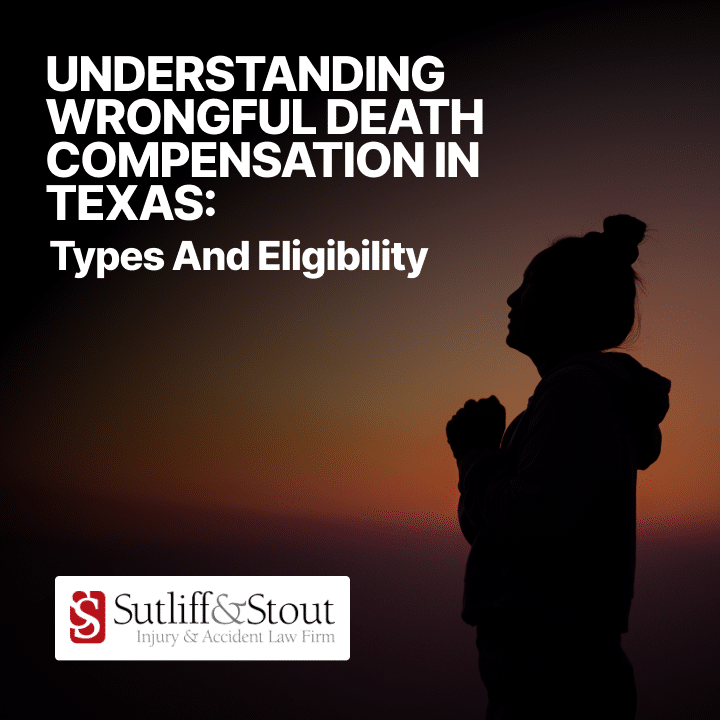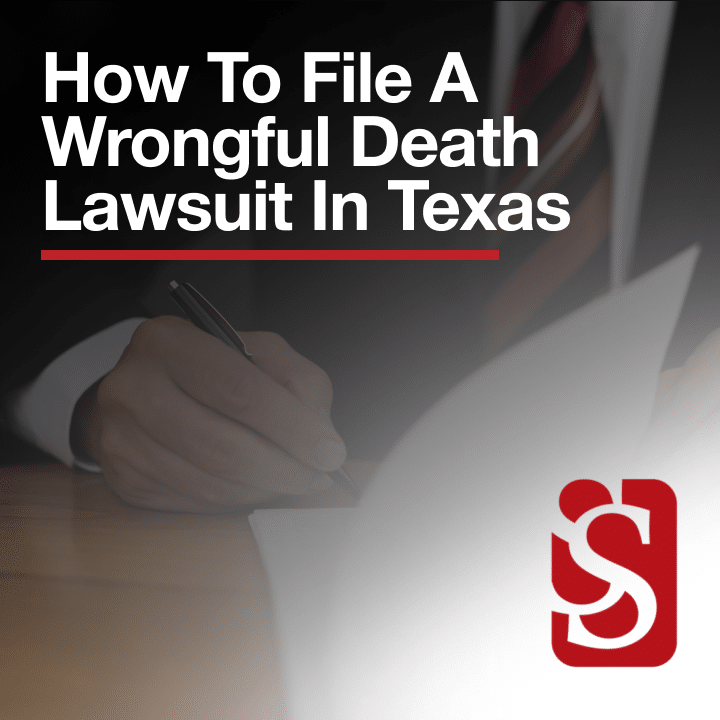
Losing a loved one is always devastating, but when that loss occurs due to someone else’s negligence or wrongful act, the pain is compounded by questions of justice and financial security. At Sutliff & Stout, we understand the complex emotional and financial challenges facing families after a wrongful death. This guide will help you understand the compensation available to survivors in Texas, who qualifies to receive it, and how our experienced attorneys can help you navigate this difficult process.
What is Wrongful Death Compensation in Texas?
Wrongful death compensation in Texas refers to the financial recovery available to certain family members when a person dies due to the negligence, carelessness, or intentional actions of another party. Under the Texas Wrongful Death Act, these claims seek to provide monetary support to those who depended on the deceased person financially and emotionally.
Unlike criminal proceedings that aim to punish the responsible party with imprisonment or fines payable to the state, wrongful death claims are civil actions designed to compensate the family members left behind. These claims acknowledge that the sudden loss of a loved one creates both immediate and long-term financial hardships, as well as profound emotional suffering.
Who is Eligible to Seek Wrongful Death Compensation?
Texas law is specific about who can file a wrongful death claim. Not all family members or dependents qualify, regardless of their relationship with the deceased. Understanding these eligibility requirements is the first step in pursuing the compensation your family deserves.
Spouses, Children, and Parents
Under Texas law, the primary beneficiaries who can file wrongful death claims are:
- The surviving spouse (whether through formal marriage or common-law marriage recognized in Texas)
- Biological and legally adopted children of the deceased (including adult children)
- Parents of the deceased (including adoptive parents)
These immediate family members have the legal standing to bring a wrongful death claim individually or jointly. Notably, Texas law does not extend this right to siblings, grandparents, or other relatives, regardless of how close their relationship was with the deceased.
Financial Dependents with Evidence of Support
In certain circumstances, individuals who were financially dependent on the deceased may have grounds to seek compensation, even if they fall outside the primary categories. However, these cases require substantial evidence demonstrating:
- A consistent pattern of financial support from the deceased
- Genuine dependency on that support for basic needs
- An expectation that such support would have continued had the death not occurred
Courts typically require documentation such as regular financial transfers, bill payments, or other evidence showing the deceased person’s consistent financial contributions to the dependent’s welfare.
Estate Representatives After Three Months
Under Texas law, if eligible family members (spouses, children, or parents) do not file a wrongful death claim within three months of the death, the personal representative or executor of the deceased’s estate may file the claim on their behalf. This provision ensures that:
- Families who are initially overwhelmed by grief have additional time to consider legal action
- The right to compensation is preserved even when immediate family members are unable to pursue a claim
- Someone is designated to act on behalf of all beneficiaries
It’s important to note that if family members explicitly object to the filing, the estate representative cannot proceed with the claim. Additionally, any compensation recovered by the estate representative is still distributed to the eligible family members according to Texas law, not to the estate itself.
Types of Compensation in Wrongful Death Cases
When pursuing a wrongful death claim in Texas, several categories of damages may be available to eligible family members. Understanding these different types of compensation can help you comprehend what your family might recover.
Economic Damages for Lost Earning Capacity
Economic damages represent the tangible financial losses resulting from your loved one’s death. These calculable losses include:
- Lost income and benefits the deceased would have earned throughout their expected career
- Loss of inheritance that would have been accumulated and passed down
- Medical expenses incurred before death related to the fatal injury or illness
- Funeral and burial expenses
- Value of services the deceased provided to the household (childcare, home maintenance, etc.)
These damages are typically calculated using financial records, employment history, and economic experts who can project the deceased’s likely career trajectory and earnings.
Non-Economic Damages for Pain and Suffering
Non-economic damages address the profound emotional and psychological impacts of losing a loved one. While harder to quantify than economic losses, these damages recognize the devastating personal consequences of wrongful death:
- Mental and emotional anguish
- Loss of companionship, love, and guidance
- Loss of consortium (for spouses)
- Loss of parental guidance and nurturing (for children)
- Loss of filial care and support (for parents)
Texas courts consider factors such as the closeness of the relationship, the deceased’s age and health before death, and the circumstances surrounding the death when determining appropriate non-economic damages.
Punitive Damages for Gross Negligence
In cases involving particularly egregious misconduct, punitive damages (also called exemplary damages in Texas) may be awarded. These damages go beyond compensation and serve to:
- Punish the responsible party for extreme recklessness or intentional misconduct
- Deter similar behavior by others in the future
- Send a message about community standards and the value of human life
To qualify for punitive damages, the plaintiff must prove gross negligence or willful acts—a standard higher than ordinary negligence. Examples might include drunk driving with an extremely high blood alcohol content, a company knowingly allowing dangerous working conditions, or intentional violent acts.
Proving Eligibility for Wrongful Death Compensation
Establishing your right to compensation in a wrongful death case requires meeting specific legal standards and presenting compelling evidence. Working with an experienced attorney can significantly improve your chances of successfully demonstrating eligibility.
Establishing the Relationship to the Deceased
For immediate family members (spouses, children, and parents), proving the relationship usually involves documentation such as:
- Marriage certificates
- Birth certificates
- Adoption papers
- DNA test results (if relationship is contested)
- Common-law marriage evidence (for spouses in informal marriages)
For those claiming dependency outside these relationships, additional evidence becomes crucial to establish legal standing.
Demonstrating Financial Impact
A successful wrongful death claim requires evidence of the financial impact the death has had and will continue to have on survivors. This typically involves:
- Income tax returns
- Employment records
- Evidence of benefits
- Household financial statements
- Testimony from economic experts who can calculate projected future losses
- Evidence of services the deceased provided to the family
The more comprehensive your documentation, the stronger your case for appropriate compensation.
Legal Representation and Documentation
Navigating wrongful death claims requires specialized legal knowledge and experience. An attorney who focuses on wrongful death cases can:
- Gather and organize the necessary documentation
- Consult with economic experts to calculate damages
- Handle communications with insurance companies and opposing counsel
- Prepare compelling legal arguments demonstrating your eligibility
- Present your case effectively in settlement negotiations or at trial
The right legal representation can make a substantial difference in both the process and outcome of your wrongful death claim.
Statute of Limitations for Wrongful Death Claims
Understanding the time constraints for filing a wrongful death claim is critical—missing these deadlines can permanently bar your right to compensation.
Two Years from the Date of Death
In Texas, the statute of limitations for wrongful death claims is generally two years from the date of death. This means eligible family members must file their lawsuit within this two-year window or risk losing their right to seek compensation entirely.
There are limited exceptions that might extend this timeline, such as:
- Cases involving minors (the clock may not start until they reach adulthood)
- Situations where the cause of death wasn’t immediately known
- Cases against governmental entities (which often have shorter notice requirements)
- Certain circumstances where the “discovery rule” might apply
However, these exceptions are narrowly interpreted by courts, making it essential to consult with an attorney as soon as possible after a wrongful death occurs.
Impact of Wrongful Death Compensation on Survivors
While no amount of money can replace a lost loved one, wrongful death compensation serves important practical and emotional purposes for surviving family members.
Financial Stability and Support
Wrongful death compensation helps ensure that families don’t face financial ruin in addition to their emotional suffering. This financial support can:
- Replace lost income that supported the household
- Cover outstanding medical bills and funeral expenses
- Provide for children’s education and future needs
- Maintain the family’s standard of living
- Allow survivors time to grieve without immediate financial pressure
For many families, this compensation makes the difference between financial stability and severe hardship during an already difficult time.
Closure and Justice for Wrongful Acts
Beyond the financial aspects, wrongful death claims provide a form of justice and accountability that many families need for emotional closure:
- Holding the responsible party publicly accountable
- Creating a sense that the legal system recognizes their loss
- Establishing a record of what happened to their loved one
- Potentially preventing similar incidents from happening to others
- Providing validation of the family’s suffering and their loved one’s value
This aspect of wrongful death claims often proves just as important as the financial compensation for many grieving families.
Legal Advice Awaits – Book Your Free Consultation!
If you’ve lost a loved one due to someone else’s negligence or wrongful actions, you don’t have to go through the challenging legal process alone. At Sutliff & Stout, our experienced wrongful death attorneys understand both the technical legal requirements and the emotional sensitivity these cases demand.
We offer free, no-obligation consultations to help you understand your legal options and determine the best path forward for your family. During this consultation, we’ll:
- Listen to your story with compassion and respect
- Explain Texas wrongful death laws as they apply to your situation
- Assess the potential strength of your claim
- Outline the legal process and what you can expect
- Answer any questions you may have about pursuing compensation
Taking this first step involves no financial risk—you pay nothing unless we recover compensation for your family.
Don’t let concerns about legal fees prevent you from seeking the justice and financial support your family needs. Contact Sutliff & Stout today to schedule your free case evaluation. Our dedicated team is here to support you through this difficult time and fight for the compensation your family deserves.
- Understanding Wrongful Death Compensation in Texas: Types and Eligibility - June 15, 2025
- Understanding Car Accident Court Cases - June 2, 2025
- Who Pays for Car Damage After an Accident in Texas? - May 20, 2025




 (713) 405-1263
(713) 405-1263  550 Post Oak Blvd, Suite 530
550 Post Oak Blvd, Suite 530